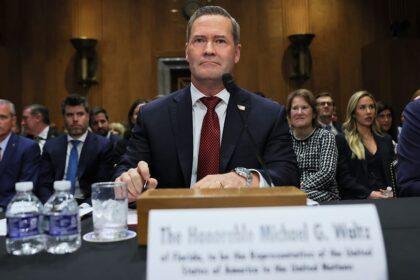DOJ Officials Address Comey Indictment Amid Speculation
CHICAGO – In a recent interview, top officials from the Department of Justice (DOJ) dismissed rampant speculation regarding the potential arrest of former FBI Director James Comey. This statement comes just a day before Comey is set to appear in court to face charges related to alleged false statements made to Congress. The remarks were made by Deputy Attorney General Todd Blanche and FBI Director Kash Patel during a visit to the FBI’s Chicago Field Office.
Dismissing the “Perp Walk” Rumors
Blanche characterized the rumors surrounding a possible “perp walk”-a term used to describe a public arrest intended for media spectacle-as mere distractions. “We conduct arrests at every courthouse in this country every single day of the year,” he stated, emphasizing that the focus should remain on the legal proceedings rather than sensationalized media narratives. He further described the speculation as “gossip,” asserting that it detracts from the serious nature of the case.
Patel echoed these sentiments, labeling the media reports as a “detraction” from the FBI’s ongoing work. He underscored the importance of focusing on the judicial process rather than engaging in theatrics. “We’re not about theater. We’re about producing our results in court,” Patel said, indicating that the upcoming court appearance would reveal significant details about the case.
The Charges Against Comey
James Comey, who served as FBI Director from 2013 to 2017, has been summoned to a courthouse in Virginia to face charges of making false statements to Congress and obstructing a congressional proceeding. These charges stem from his involvement in the investigation into Russian interference in the 2016 presidential election, a topic that has remained contentious in American politics.
The indictment has raised eyebrows, particularly given Comey’s high-profile role during the Trump administration. His testimony before Congress has been scrutinized, and the current charges could have far-reaching implications for both Comey and the DOJ. Legal experts suggest that the case may set a precedent for how former officials are held accountable for their actions while in office.
Historical Context: The Comey Controversy
The controversy surrounding Comey is not new. His tenure as FBI Director was marked by significant events, including the investigation into Hillary Clinton’s use of a private email server and the inquiry into Russian interference in the 2016 election. Comey’s decision to publicly announce the reopening of the Clinton investigation just days before the election has been widely criticized and is often cited as a factor that may have influenced the election’s outcome.
The current indictment adds another layer to an already complex narrative. It raises questions about accountability and transparency within the federal government, particularly regarding how officials are treated after leaving office. The legal proceedings against Comey could serve as a litmus test for the Biden administration’s approach to former officials and their conduct.
The Impact of Media Speculation
The media’s role in shaping public perception cannot be understated. Reports suggesting that an FBI official was fired for refusing to participate in a staged arrest of Comey have fueled speculation and controversy. Such narratives can create a sensationalized atmosphere that complicates the legal process and distracts from the substantive issues at hand.
Blanche and Patel’s comments highlight a growing concern among law enforcement officials about the impact of media speculation on ongoing investigations. The DOJ has faced criticism in the past for its handling of high-profile cases, and the current situation with Comey is no exception. The officials’ insistence on focusing on the judicial process rather than media theatrics reflects a desire to maintain the integrity of the legal system.
Looking Ahead: The Court Appearance
As Comey’s court appearance approaches, the nation is poised for a significant moment in the ongoing saga of political accountability. The legal proceedings will not only determine Comey’s fate but may also influence public opinion regarding the DOJ’s handling of politically charged cases.
Patel emphasized the importance of allowing the judicial process to unfold, stating, “Everyone in America is entitled to their day in court, including Mr. Comey.” This statement underscores the principle of due process, a cornerstone of the American legal system.
Conclusion
The upcoming court appearance of James Comey is set against a backdrop of intense media speculation and political controversy. As DOJ officials work to refocus attention on the legal proceedings, the implications of this case extend beyond Comey himself. It raises critical questions about accountability, transparency, and the role of media in shaping public perception of justice. As the situation develops, all eyes will be on the courtroom, where the next chapter in this high-stakes drama will unfold.










